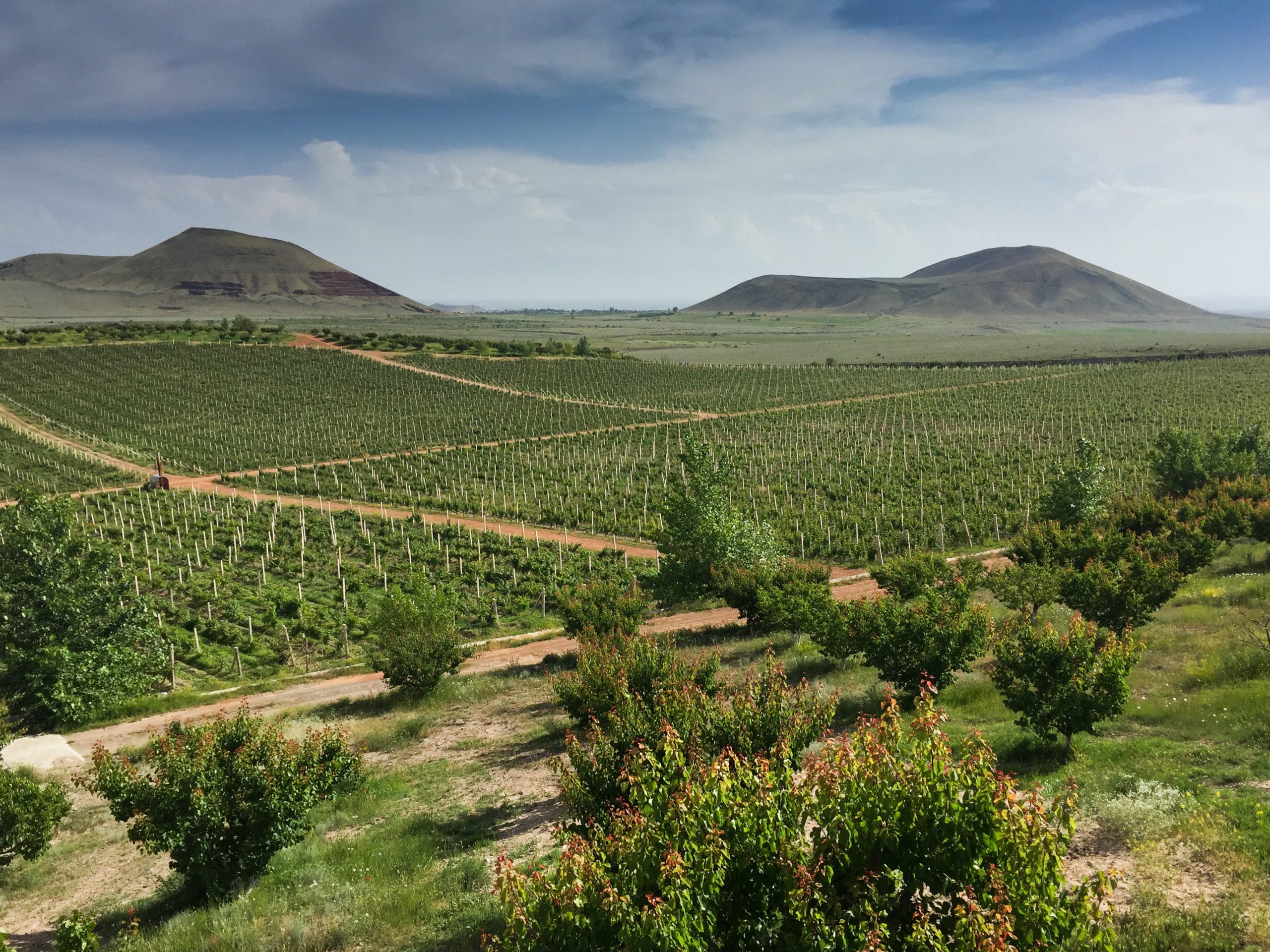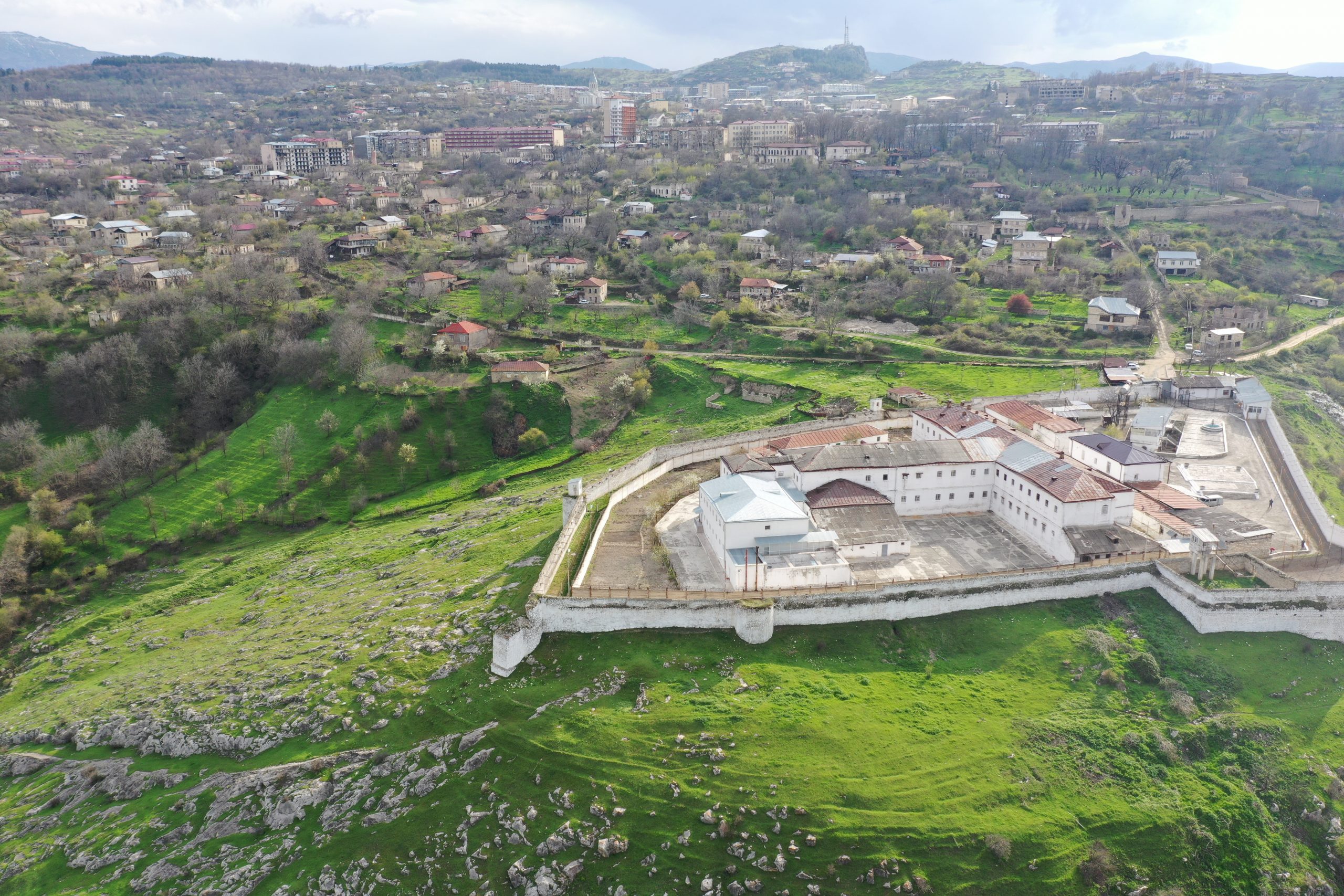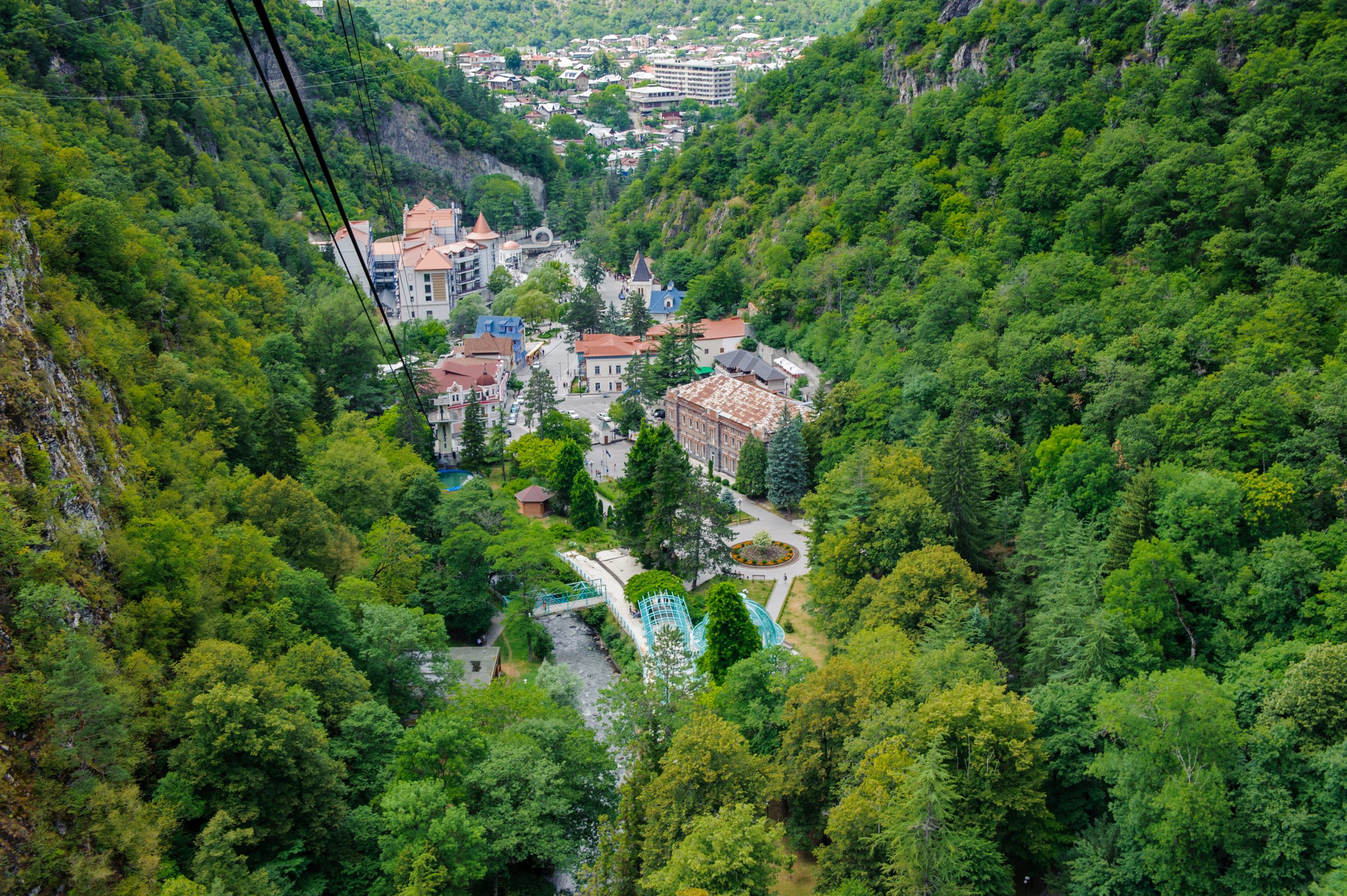Strategic Analysis Caucasus Brief
Bi-weekly review (26. 2. – 12. 03. 2023)
Tomáš Baranec
Armenia

Vineyards, Aragatsotn province, Armenia. Photo: Elena Diego/ Shutterstock.com
Armenia’s Amulsar Gold Mine to Resume Operations
The Government of Armenia has inked a 250 million USD deal with Lydian Armenia, the company that owns the license to operate the vast Amulsar gold mine, effectively allowing the resumption of operations. The agreement is a trilateral Memorandum of Understanding among the Armenian Government, the Eurasian Development Bank, and Lydian Armenia. The company will give the Armenian Government 12.5% of its shares in exchange for the right to run the mine.
The project has had a long and controversial history in Armenia. It sits above a tunnel that supplies water to Lake Sevan, the largest freshwater lake in the Caucasus region. In Armenia’s mountainous south, opponents to the project forced the company to halt operations in 2018. They claimed Amulsar would threaten several endangered animal species. These include the world’s rarest big cat, the Caucasian Leopard, of which there are thought to be only ten left in Armenia.
Lydian International, the previous owner, made several efforts to get the project off the ground, including hiring a third party to review the company’s Environmental and Social Impact Assessment (ESIA) and Environmental Impact Assessment (EIA).
Despite positive results from the study, and the company’s intention to bring the case to international arbitrage, Lydian International finally gave up.
The company, which claimed to have invested 370 million USD in the project before activist blockades, filed for bankruptcy protection in Canada in late 2019 before being restructured. The project currently belongs to Lydian Armenia, a subsidiary of Lydian Canada Ventures, which Orion Mine Finance owns in the United States and Osisko Gold Royalties in Canada.
The Eurasian Development Bank (EDB) plans to extend a loan of up to 100 million USD in addition to the 150 million USD mobilised by Lydian. The lender’s help will finance the completion of construction, which is scheduled to resume this year.
The decision to operate the Amulsar mine was slammed by environmentalists and civil society representatives demanding a new environmental impact assessment and whose concerns over the risks persisted for years. Some experts even expressed concern that Fitch and Moody’s ratings downgraded the Eurasian Development Bank due to the risks caused by Russia’s war in Ukraine. This implies that in the case of the deepening of the Ukraine war, the Eurasian Development Bank might come under sanctions as Russia owns a majority stake in the bank.
Sources:
- JAMASMIE Cecilia, Mining.com, „Armenia approves restart of Amulsar gold mine“, https://www.mining.com/armenia-approves-restart-of-amulsar-gold-mine/
- Caucasus Watch, “Armenia’s Amulsar Gold Mine to Resume Operations“, https://caucasuswatch.de/en/news/armenias-amulsar-gold-mine-to-resume-operations.html
Chairman of the Armenian Parliament: “Russia Cannot Provide Armenia’s Security under CSTO.”
The Speaker of the Armenian Parliament, Alen Simonyan, called on Moscow to be more restrained and admit that it cannot ensure Armenia’s security as stipulated by Russian-Armenian treaties and the CSTO treaty.
Simonyan said that while Russia undoubtedly contributes to the improvement of ties between Armenia and Azerbaijan and has peacekeepers stationed in Nagorno-Karabakh, the country’s irrational and emotional response to other countries’ attempts to further this goal is puzzling. “I think Russia should be a little calmer, restrained and should understand that Armenia has its own interests and security problems, which should be ensured despite geopolitical fluctuations, someone’s desires or jealousy,” Simonyan said.
He added that Russia should publicly admit it cannot solve Armenia’s security issues. “They always say they are in favour of someone else being able to solve the issue differently. But the fact is that it is up to them to solve this issue. They should have solved this issue [reopening of the Lachin corridor, the only road linking Nagorno-Karabakh and Armenia]. Let’s be honest, they are the ones who are to ensure our security and territorial integrity as provided for by many treaties,” said Simonyan.
In response to deploying some 100 EU monitors to Armenia’s border with Azerbaijan, Russia accused the European Union of trying to squeeze it out of the South Caucasus. In an official statement, the Russian Foreign Ministry argued that the civilian monitoring mission would not reduce the risk of fresh fighting on the Armenian-Azerbaijani border.
Sources:
- Massis Post, „Simonyan: Russia Should Be More Restrained and Admit That it Cannot Ensure Armenia’s Security“, https://massispost.com/2023/03/simonyan-russia-should-be-more-restrained-and-admit-that-it-cannot-ensure-armenias-security/
- Caucasus Watch, “Alen Simonyan: Russia Cannot Provide Armenia’s Security under CSTO”, https://caucasuswatch.de/en/news/alen-simonyan-russia-cannot-provide-armenias-security-under-csto.html
Armenia refuses CSTO Deputy Secretary General term
Armenia has submitted a proposal to the CSTO on relinquishing its quota of Deputy Secretary-General of the Collective Security Treaty Organization (CSTO). The Armenian Foreign Ministry has confirmed the news to Public Radio of Armenia. “We’ve presented a respective proposal to the CSTO,” foreign ministry spokesperson Vahan Hunanyan said when asked to comment on media reports claiming that Armenia has formally renounced its quota of Deputy Secretary-General.
Currently, the CSTO Secretary General has three deputies: Valery Semerikov (Russian Federation), Samat Ordabaev (Kazakhstan), and Takhir Khairuloev (Tajikistan). The Secretary-General is appointed for a three-year term, from January 1, 2023, to December 31, 2025. Imangali Tasmagambetov holds this post.
Armenia has led the organisation for the past two years. Its term ended late last year, with the presidency passing to Belarus. Following treaty protocol, Armenia’s representative was supposed to take over the position of Deputy Secretary General in 2023. However, Armenia ended its term as president of the CSTO with senior government figures expressing loud criticism of the pact, particularly in relation to its inaction during the two-day war between Armenia and Azerbaijan in September 2022.
The treaty’s terms state that an attack on one member state should be considered an attack on all. Still, the organisation neglected to offer any practical assistance after Azerbaijan launched an attack on Armenia’s territory in September. Instead, it offered only to send a fact-finding mission after the fact.
At the start of this year, the dissatisfaction with the alliance grew more explicit as Armenia’s Prime Minister Nikol Pashinyan announced that planned CSTO military drills would not take place in Armenia.
Sources:
- GHAZANCHYAN Siranush, “Public Radio of Armenia, Armenia renounces CSTO Deputy Secretary-General quota“, https://en.armradio.am/2023/03/10/armenia-renounces-csto-deputy-secretary-general-quota/
- AVETISYAN Ani, OC Media, „Armenia refuses CSTO Deputy Secretary General term“, https://oc-media.org/armenia-refuses-csto-deputy-secretary-general-term/
Baku held talks with Armenian representatives in Karabakh
On March 1, Ramin Mammadov, the Azerbaijani MP responsible for maintaining contact with Armenian residents residing in the de facto Nagorno-Karabakh, met with their representatives at the headquarters of the Russian peacekeeping contingent in Khojaly city.
According to Masim Mammadov, the head of the monitoring group investigating the illegal exploitation of natural resources, who also participated in the meeting, preliminary discussions on the reintegration of Armenian residents living in the Karabakh region were also held. MP Ramin Mammadov said that contact with Armenian residents would be continued.
Lusine Avanesyan, the de-facto Press Secretary of the separatist President of Nagorno-Karabakh, confirmed that a meeting of the representatives of Nagorno-Karabakh and Azerbaijan took place with the mediation and participation of the Russian peacekeeping forces. According to her, humanitarian and infrastructural issues, in particular, the restoration of the unhindered passage of vehicles through the Lachin corridor, the restoration of the electricity line supplying Nagorno-Karabakh from Armenia, the uninterrupted supply of natural gas, as well as the exploitation of the Kashan field, were discussed. “There were no other matters on the agenda. The meeting was apparently constructive, and we hope the results will not be long in coming,” the Press Secretary said.
This was the first meeting between Azerbaijani and Armenian officials that was reported by pro-government Azerbaijani media. Earlier meetings were reported only by outlets in Armenia and Karabakh. The meeting comes as Azerbaijan appears more focused on integrating Karabakh – governed as an unrecognised ethnic Armenian statelet since the early 1990s – into its fold and is stepping back from its demands for a seamless transportation route through the Republic of Armenia known as the Zangezur Corridor.
And it comes just days after the sacking of Karabakh’s de facto state minister Ruben Vardanyan. Azerbaijan had ardently refused to engage with the Russian-Armenian billionaire, who had resettled in Karabakh and effectively become the most influential figure in the territory.
Meanwhile, Karabakh has been under blockade since December 12, when Azerbaijani government-sponsored activists camped out on the only road linking the region to Armenia and the outside world.
Ramin Mammadov was appointed as an official to hold talks with representatives of ethnic Armenians on March 1.
Sources:
- ISAYEV Heydar, SHAHVERDYAN Lilit, Eurasianet.org, „Azerbaijan-Karabakh dialogue is happening“, https://eurasianet.org/azerbaijan-karabakh-dialogue-is-happening
- Caucasus Watch, „Karabakh and Azerbaijani Representatives Meet in Khojaly“, https://caucasuswatch.de/en/news/karabakh-and-azerbaijani-representatives-meet-in-khojaly.html
- ERUYGUR Burc, AA, „Azerbaijan appoints official for dialogue with Armenians in Karabakh: Report“, https://www.aa.com.tr/en/asia-pacific/azerbaijan-appoints-official-for-dialogue-with-armenians-in-karabakh-report/2834495
Days after the first high-profile talks, a deadly clash in Karabakh
A shooting in de facto Nagorno-Karabakh on March 5 left three Karabakh Armenian police officers and two Azerbaijani soldiers dead. The incident came just as Azerbaijan-Karabakh talks seemed to be picking up steam, and nearly three months into the blockade of Karabakh by Azerbaijani government-sponsored activists, writes Eurasinet.org.
Eyewitnesses say that gunfire was heard in Stepanakert and Shusha (Shushi). According to the Ministry of Defense of Azerbaijan, early in the morning, the Azerbaijani army received a message about the transportation of weapons, ammunition and manpower from the territory of Armenia along a dirt road detour of the Lachin road.
After that, the operational group of the Armed Forces of Azerbaijan advanced on the road to conduct a check on the ground. When they tried to stop an Armenian vehicle reported to be transporting the items, the passengers of the latter opened fire, which the soldiers returned.
The Ministry of Defense of Azerbaijan reports losses on both sides, though the exact number of dead and wounded is not known. “Today’s incident once again shows that Azerbaijan needs to install the appropriate checkpoint on the Lachin-Khandi road, reads the statement.
The Armenia media, on the other hand, reported that “the Azerbaijani sabotage group fired at members of the visa and passport department. The incident occurred in the area known as Hripal. ”Three dead are reported — Lieutenant Colonel Armen Babayan, Major David Danielyan and Lieutenant Ararat Gasparyan. Lieutenant David Hovsepyan received a gunshot wound to the chest and is in hospital.
The day before, the command of Russian peacekeeping forces deployed in Nagorno -Karabakh reported ceasefire violations in Martuni and Shushi districts.
The authorities of the unrecognised republic deny that weapons and ammo were being transported along the road.
“Police officers were travelling in a passenger car from the Artsakh side to our police station, there were no weapons or ammunition in the car,” state minister Gurgen Nersisyan said.
He called Azerbaijan’s statement “a frank attempt to mislead everyone.”
According to Nersisyan, “the Artsakh authorities have all sorts of evidence,” which “will be communicated through the Foreign Ministry as soon as possible.” Nersisyan stated that the Azerbaijani military has been active in the area, clearing settlements and other structures.
Sources:
- Horan Johan, Eurasianet.org, „Days after first high-profile talks, a deadly clash in Karabakh“, https://eurasianet.org/days-after-first-high-profile-talks-a-deadly-clash-in-karabakh
- JAM News, “Shootout in Karabakh; casualties reported“, https://jam-news.net/shootout-in-karabakh/
- Caucasus Watch, “Azerbaijan Accuses Armenia of Transportation of Military Equipment to Karabakh; Armenia Blames Baku of Sabotage“, https://caucasuswatch.de/en/news/azerbaijan-accuses-armenia-of-transportation-of-military-equipment-to-karabakh-armenia-blames-baku-of-sabotage.html
Hunger-striking prisoner dies in Baku Court of Appeal
On March 2, Sabuhi Salimov, a member of the opposition Islamic Party, died of a heart attack in court following a 53-day hunger strike in protest against his detention. Another imprisoned activist Bakhtiyar Hajiyev stopped his hunger strike the day after intimate photographs, videos, and messages were leaked from his private accounts.
Salimov was arrested in October 2021 on charges of treason and, in particular, spying for Iran. Salimov flatly denied the allegations. On November 22, 2022, the Baku Grave Crimes Court sentenced him to 17 years. In early 2023, he went on a hunger strike to protest the verdict. On March 1, after 53 days of hunger strike due to deteriorating health, Salimov stopped the hunger strike, relatives of the activist told Turan.
On March 2, in the Baku Court of Appeal, after the announcement of the decision to uphold the verdict, Salimov began to protest emotionally, in connection with which his state of health deteriorated sharply, and he died sometime later.
One day earlier, on March 1, Hajiyev topped his hunger strike after 50 days.
His lawyer, Agil Lajic, said Hajiyev had ended his hunger strike after considering public opinion. He said Hajiyev would soon receive food at the detention centre he is being held in. “[Hajiyev] thanked everyone who supported him. The legal fight will continue until justice is achieved”, Lajic said.
The leaking of Hajiyev’s personal correspondences has led to condemnation of the Government from opposition and civil society figures, who have insisted they were behind the incident. It has also led to the backlash towards Hajiyev for saving intimate images of women, despite similar leaks targeting women opposition activists and journalists.
Feminist activist Gulnara Mehdiyeva wrote that the Government had failed in its duty to protect its citizens, instead “deliberately and knowingly [attempting] to make those women victims of suicide or murder” by releasing their names, images, and, in one case, the home address, of the women. ”They think that if the life of any of these women ends tragically, her blood will be on Bakhtiyar’s hands, and the Government will thus have destroyed its rival”. “Bakhtiyar is now finished as a political activist and figure. Stop posting information and images of women who have anything to do with him! Don’t hurt anyone!” Mehdiyeva concluded.
The Interior Ministry Interior Ministry spokesperson Elshad Hajiyev denied that the ministry had viewed Bakhtiyar Hajiyev’s personal information.
Sources:
- Turan.az, „Religious activist dies in the courtroom“, https://www.turan.az/ext/news/2023/3/free/Social/en/2197.htm
- AGHAYEV Ismi, OC Media, “Bakhtiyar Hajiyev ends hunger strike after the release of intimate images“, https://oc-media.org/bakhtiyar-hajiyev-ends-hunger-strike-after-release-of-intimate-footage/
Georgia’s ruling party dropped foreign agent bills after major protests
The ruling Georgian Dream party have formally voted down the draft foreign agent law in its second reading, killing the bill after two nights of protests shook Tbilisi. On March 9, the ruling Georgian Dream’s Political Council, People’s Power, and the Parliamentary majority released a joint statement stating that the draft regulations regarding foreign agents had been withdrawn from the parliament as a result of internal deliberations.
“We can observe that the passed law has led to societal disagreements. The deception apparatus successfully portrayed the law negatively and misled certain members of the public. The measure was given the false name of ‘Russian legislation,’ and some people perceived the bill’s passage in the first reading as a break from the European route,” the statement said. According to the Government’s statement, the protesters involved some children in illegal activities, too.
“We should be more worried about peace, tranquillity, and economic growth in our nation, as well as Georgia’s progress toward European integration. Hence, it is important for each of our fellow citizens to focus on helping the country develop in the correct path rather than engaging in conflict,” the joint statement added.
The ruling party had initially said they could not schedule a second reading of the bill to vote it down for over a week, insisting it would be legally impossible to expedite it. After protest leaders and opposition figures expressed concern they may be attempting to play for time, the party called an extraordinary session of parliament to take place on March 10.
Two days of mass protests and clashes forced the ruling Georgian Dream party to reverse course on the bills, widely seen as a direct attack on critical voices and national hopes for integration with the European Union.
On March 7, following a last-minute schedule change, the parliamentary majority adopted the first of the bills, “on transparency of foreign influence,” in the first reading.
The legislative deliberations inspired massive protests as tens of thousands rushed to the parliament building over the past two days. On both protest nights, riot police used water cannons, tear gas, and pepper spray to disperse the crowds, only to see large groups of protesters reassemble and continue their resistance.
The situation was particularly dramatic on the night of March 8-9, when protesters turned to blocking roads, building barricades, and dancing to police sirens in response to the police’s use of force. Over 130 persons were detained during the protests, according to official sources.
The adoption of the first bill in the first reading came amid enormous international pressure. In particular, Brussels made it clear that adopting the “foreign agents” bill would go against the country’s declared (and constitutionally enshrined) path of European integration and threaten the country’s bid to receive EU candidate status later this year.
The United States echoed the sentiment. “Today is a dark day for Georgia’s democracy,” said the US Embassy in Tbilisi. “Parliament’s advancement of these Kremlin-inspired laws is incompatible with the people of Georgia’s clear desire for European integration and its democratic development.”
Following the bill’s defeat, Georgian Dream struck isolationist and ultraconservative notes in its justification of the law. Party chairman Irakli Kobakhidze praised the bill for exposing organisations that engage, among other things, in “LGBT propaganda” and “denigration of the Church.”
Sources:
- GABRITCHIDZE Nini, Eurasianet.org, “Georgia’s ruling party pledges to drop foreign agent bills after major protests“, https://eurasianet.org/georgias-ruling-party-pledges-to-drop-foreign-agent-bills-after-major-protests
- LOMSADZE Giorgi, Eurasianet.org, „Georgian protesters win a battle, war may still be ahead“, https://eurasianet.org/georgian-protesters-win-a-battle-war-may-still-be-ahead
- KINCHA Shota, OC Media, „Georgian Dream formally kill foreign agent draft law“, https://oc-media.org/georgian-dream-kill-foreign-agent-draft-law/
- Caucasus Watch, „Foreign Agents Bill Withdrawn from Georgian Parliament“, https://caucasuswatch.de/en/news/foreign-agents-bill-withdrawn-from-georgian-parliament.html



Contact us